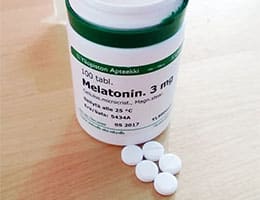 Melatonin is a hormone found in algae, bacteria, fungi, plants, animals and people. This substance intervenes in multiple cellular processes and is linked to the sleep cycle .
Melatonin is a hormone found in algae, bacteria, fungi, plants, animals and people. This substance intervenes in multiple cellular processes and is linked to the sleep cycle .
In vertebrates, melatonin is produced primarily in the pineal gland , an endocrine gland also called the cerebral epiphysis. Its elaboration is influenced by the suprachiasmatic nucleus of the hypothalamus , which in turn processes information from the retina regarding dark and light patterns.
If a subject has a reduced level of melanin, they can suffer from insomnia to depression . Furthermore, it is believed that this deficiency causes the aging process to develop more rapidly.
It is important to keep in mind that melatonin secretion varies according to endogenous and environmental factors. In this way, age , the season of the year, stress, temperature and exposure to light affect the presence of melatonin in the body.
The release of melatonin occurs in the dark . That is why its production increases as the ambient light decreases: it is estimated that the greatest production takes place between 2 and 4 hours . Once it is released by the pineal gland, melatonin reaches all tissues and cells through blood circulation.
Sleep habits are regulated by this hormone that synchronizes the biological clock. People who cannot sleep well can turn to melatonin, which is sold in pharmacies, usually in capsule form. In any case, consuming melatonin can cause side effects such as nausea, drowsiness, dizziness, and headaches.
On the one hand, some research supports the consumption of melatonin supplements to combat delayed sleep phase and insomnia, among other sleep disorders . However, if used for a long time without pause, it can cause side effects such as those mentioned in the previous paragraph or others, less common but more serious, such as temporary symptoms of depression, slight tremors, increased irritability, disorientation, hypotension, anxiety. , colic and feeling of confusion.
 Apart from the direct side effects, it is necessary to know that melatonin supplements cannot always be consumed in conjunction with other medications , including antiplatelet agents, anticoagulants, contraceptives, anticonvulsants, those that treat diabetes and immunosuppressants.
Apart from the direct side effects, it is necessary to know that melatonin supplements cannot always be consumed in conjunction with other medications , including antiplatelet agents, anticoagulants, contraceptives, anticonvulsants, those that treat diabetes and immunosuppressants.
This brings us to the distinction between morning people and evening people. The former produce melatonin during the first hours of sleep and for this reason they rest adequately during the night and have no difficulty getting up early. In the case of evening people, on the other hand, the secretion of melatonin takes place later, when the end of the night is approaching, and this means that it is not easy for them to get up early.
Morning people tend to be especially active and productive during the first hours of the day: not only do they get out of bed early, but their brain seems to load all the information necessary to converse and solve problems in a matter of seconds. They are especially efficient in office work that starts at dawn.
Evening people, on the other hand, experience a much slower and more difficult start: they do not enjoy getting up early at all, they tend to be unfriendly during the first hours of the day and do not like to be talked to or pressured to answer questions until they finally settle down. they wake up And it is then, in the afternoon, that the situation is reversed, since their performance increases while that of the morning workers decreases.
